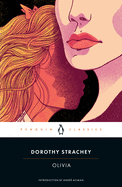
An oft-forgotten classic from 1949, Dorothy Strachey's Olivia is a groundbreaking story of homosexual desire and self-awakening. At 16 years old, Olivia is shipped off by her proper, English parents to an all-girls Parisian boarding school. Almost instantly, Olivia becomes a favorite of the intelligent, charming headmistress, Mademoiselle Julie. As their student-mentor relationship deepens and takes on erotic undertones, Olivia becomes aware of dark secrets among the school's students and faculty members. Tensions and passions mount as the school year draws to a close, and Olivia senses, despite her hopes and desires, that her first passionate love is destined to end in disappointment.
With a new introduction by André Aciman, Olivia's first-person narration begins with a line as true now as when Olivia was written: "The world, I know, is changing." Like its protagonist, caught between the worlds of childhood and adulthood, the novel stands poised mid-transformation, summoning in the same stroke a series of contrasts: materialism and spirituality, the traditional and modern, denial and confession. Olivia attempts to put words to the "anomalous lack" that defines her ravenous desires, and her passion is palpable in the novel's prose, which invokes all the ecstasies and devastations of adolescence and want. Richly textured by the politics of the female boarding school world, the novel captures the jealousies, obsessions, rages, and tenderness that complexly define its characters. The beauty of Strachey's novel ultimately lies in the effortless illustration of what it means to feel another person, of lying in bed in the dark, sensing someone standing just on the other side of the door. --Alice Martin, freelance writer and editor

